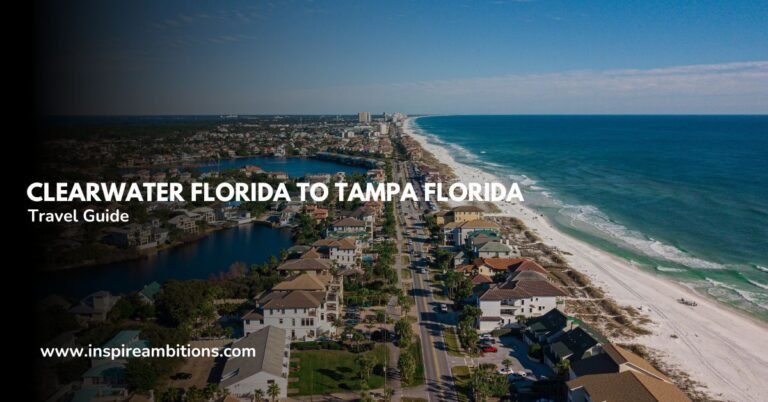Living in Texas vs Florida – A Comprehensive Comparison
When considering a move to a new state, the choice between Florida and Texas can pose a unique set of questions. These two states, often celebrated for their robust economies, distinct cultures, and diverse environments, attract new residents with many opportunities and lifestyles.
Whether it’s the allure of Florida’s sandy beaches and year-round warmth or Texas’s wide-open spaces and significant cultural heritage, each state offers a unique proposition for those seeking change.

The decision to reside in Florida or Texas impacts various aspects of daily life, from the cost of living and the housing market to climate and environmental factors. Both are known for having no state income tax, which is attractive from a financial standpoint, but each has its way of offsetting those costs through other means.
Additionally, the lifestyle and amenities offered in each state cater to different preferences, making it essential to weigh what’s most important to you when moving.
Living in Texas vs Florida – Key Takeaways
- Comparing Florida and Texas reveals significant differences in cost of living, climate, and lifestyle amenities.
- Both states offer unique advantages related to taxes, homeownership, and personal preferences for environment and entertainment.
- Safety, quality of life, and the overall cultural vibe vary between Florida and Texas, influencing the decision of potential movers.
Cost of Living and Housing

When considering a move to Texas or Florida, it’s vital to understand the difference in the cost of living and available housing options. These factors will significantly impact your budget and lifestyle.
Economy and Employment Opportunities
- Texas: The Lone Star State boasts a robust economy with a diverse range of industries, including energy, technology, and agriculture. This diversity offers numerous employment opportunities, contributing to a relatively low unemployment rate compared to the national average.
- Florida: Known for tourism and agriculture, Florida also offers employment opportunities, though the focus is more service-oriented, which can affect income levels and job security.
Taxes and Income
- Sales Tax: In Florida, the sales tax tends to be lower, affecting your overall cost of living. Texas compensates for its higher sales tax with no personal income tax.
- Income: While both states boast no personal income tax, your income potential may vary based on the job market and prevailing wages in your industry.
Property Market
- Housing Costs: Texas generally offers more affordable housing costs than Florida, with a significant difference in home values and rent prices.
- Property Tax: One should note that while housing prices may be lower in Texas, the property taxes can be higher compared to Florida. It’s essential to consider this when purchasing a home.
- Home Values: Home values can fluctuate significantly between the two states, with Florida’s property market often being influenced by its coastal location, impacting both demand and home price.
Climate and Environment
The choice between Texas and Florida affects your experience of weather, climate, and environmental features. Each state brings unique aspects of sunshine, temperature fluctuations, and natural events that you should consider.
Weather Patterns
Texas offers a diverse climate, ranging from arid in the west to humid in the east. The Gulf of Mexico influences weather in coastal regions, contributing to milder winters and hot, humid summers. Specifics include:
- Extreme temperatures in cities like Dallas, where summer highs can soar
- Higher variability in weather due to Texas’s vast size
In contrast, Florida’s climate is generally more tropical, with consistent warmth throughout the year and higher overall humidity levels:
- Steadier temperature range with warmer winters
- Frequent sunshine and ample rainfall, especially in the summer months
Natural Disasters
Residents in both states must prepare for distinct natural disasters:
- Florida is prone to hurricanes due to its peninsular shape and warm waters from the Gulf of Mexico and Atlantic Ocean
- Texas deals with hurricanes and tornadoes, particularly in the north-central part of the state known as Tornado Alley.
Both states require robust building codes and disaster preparedness due to these risks.
Outdoor Recreation
The warm climates of both states offer ample outdoor recreational opportunities year-round:
- Florida boasts access to beaches and activities like fishing and boating in the Gulf of Mexico
- Texas’s Hill Country region provides scenic drives and hiking trails for more adventure-focused residents
Be mindful of the heat and humidity when planning outdoor activities, especially in Texas’s more arid regions or Florida’s tropical south.
Lifestyle and Amenities
As you contemplate a move to Texas or Florida, the lifestyle and amenities each state offers play a crucial role in your decision-making. From diverse cultural experiences and entertainment options to robust healthcare and education systems, each state boasts unique features that cater to its residents’ needs.
Furthermore, the transportation and infrastructure in these states significantly impact your daily life, providing varying degrees of accessibility and connectivity.
Culture and Entertainment
Texas prides itself on a rich tapestry of cultural diversity, offering various entertainment options. You’ll likely find vibrant music scenes, including the famous Austin festivals that echo the state’s reputation as the “Live Music Capital of the World.” The Tex-Mex cuisine and legendary BBQs are central to Texas’s culture, providing a feast for the senses.
- Music and Sports: Texas cities boast impressive sports teams and lively music scenes.
- Food: A robust food scene with an emphasis on BBQ and Tex-Mex.
With its warm climate and scenic beaches like Miami Beach, Florida invites a laid-back yet exciting lifestyle. Its diverse population ensures a myriad of cultural activities and events. From the buzzing nightlife in Miami to family-friendly theme parks in Orlando, Florida, it offers a variety of entertainment avenues.
- Theme Parks: Home to an array of world-famous theme parks.
- Beaches and Nightlife: Offers access to beautiful beaches and vibrant nightlife, especially in cities like Miami.
Healthcare and Education
Florida boasts advanced facilities and ranks well nationally in healthcare service provision. You’ll find a network of hospitals and clinics in large metropolitan areas or smaller communities.
- Texas: Known for renowned healthcare institutions in Houston and Dallas.
- Florida: Notable for its retirement communities with access to excellent healthcare services.
Education in both states includes a range of high-quality institutions, from public schools to elite universities. Texas, for example, is home to prestigious schools like the University of Texas and Texas A&M. At the same time, Florida hosts several notable institutions, including the University of Florida and Florida State University.
- Schools and Universities: A wide selection of notable educational institutions.
Transportation and Infrastructure
An extensive network of highways connects Texas’s vast landscape, making road travel a common choice for inter-city transit. Meanwhile, cities like Houston and Dallas are expanding their public transportation systems to provide more options for commuters.
- Roads: Expansive highway systems connecting major cities and towns.
- Public Transit: Growing public transportation options in major metropolitan areas.
Florida’s infrastructure includes a mix of transportation options. Cities like Jacksonville have sizeable port facilities that bolster trade and provide employment opportunities. Furthermore, several cities are known for their walkability and commitment to public transit expansions.
- Ports and Employment: Significant port facilities offering employment opportunities.
- Walkability and Public Transit: An emphasis on walkable cities and improved public transit systems.
Safety and Quality of Life
When considering relocation, the safety and quality of life are crucial factors. Texas and Florida each offer distinct benefits and challenges that can impact your day-to-day life. You’ll need to weigh factors such as crime rates, overall tax burdens, and the cost of living index to determine which state aligns better with your lifestyle preferences.
Crime Rates and Safety
- Texas: The Lone Star State’s crime rates vary significantly depending on the area. On average, some parts of Texas have higher crime rates than the national average. Nevertheless, cities like Plano and Allen are noted for their safety and lower crime rates.
- Pros:
- Safe communities in selected cities
- Robust law enforcement presence
- Cons:
- Higher crime rates in some urban regions
- Traffic congestion can affect the quality of life in major cities
- Pros:
- Florida: Known as the Sunshine State, Florida also exhibits a mixed safety record with crime rates that fluctuate across different regions. Cities like Naples and Marco Island often rank high for safety.
- Pros:
- Lower crime rates in various suburban and coastal areas
- Focused efforts on crime prevention and community safety
- Cons:
- Higher crime rates in some larger cities
- Some areas are prone to natural disasters, which can temporarily disrupt safety and services
- Pros:
Advantages of Living in Texas and Florida
- Quality of Life:
- Texas boasts a strong job market, diverse cultures, and a lower overall tax burden than many other states, contributing positively to the quality of life.
- Florida offers year-round warm weather, beautiful beaches, and a favourable tax climate with no personal income tax, enhancing its quality of life.
- Cost of Living:
- Texas: Generally has a reasonable cost of living index, though this can be higher in metropolitan areas like Dallas and Houston.
- Florida: Cost of living can vary, with some areas like Miami being quite expensive, while other parts of the state are more affordable.
When considering Texas versus Florida, reviewing these factors in light of your safety and quality of life priorities is essential, as both the Lone Star State and the Sunshine State have much to offer.







